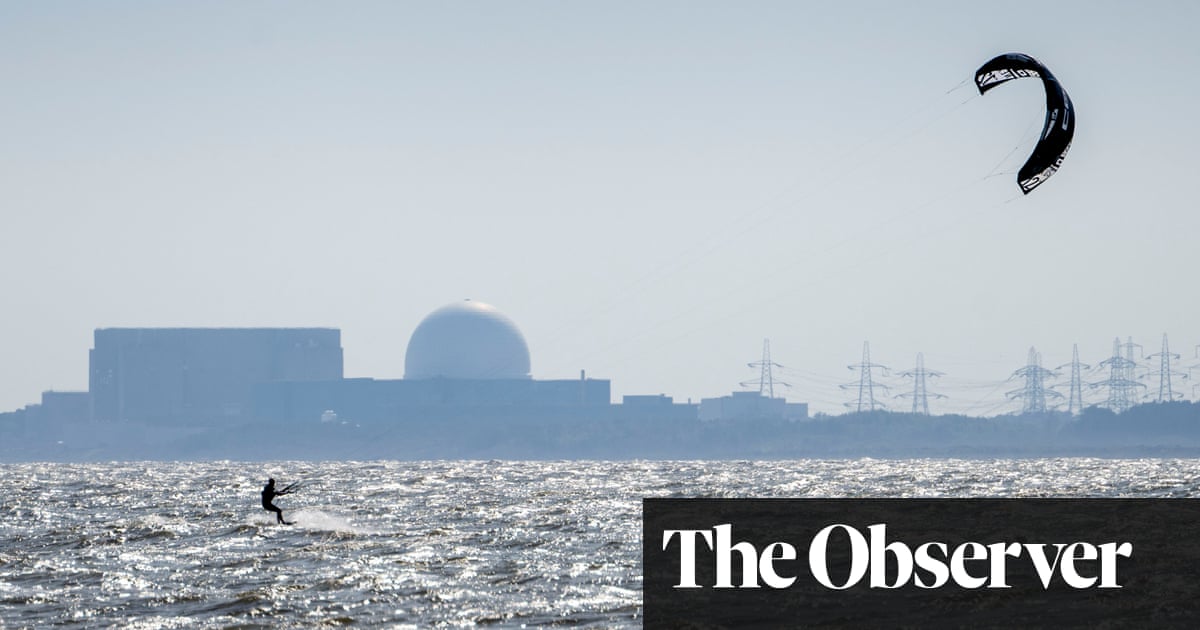
When it comes to the future of the planet, the Tory leadership contest has got off to a dismal start.
Rows erupted over the government’s flagship climate policy – the target of reaching net zero greenhouse gas emissions by 2050 – almost as soon as Boris Johnson sagged back into No 10 after his resignation speech.
Several leadership candidates cast doubt on the net zero target, vowed to change it in some way, or took stances against some of the green policies needed to reach it. Several of these candidates have since been eliminated, and on Friday four of the five remaining candidates committed to preserving the net zero target, with only Kemi Badenoch still holding out.
However, campaigners believe the lack of enthusiasm for climate action among some MPs does not bode well for future action. A new prime minister could easily ascend to 10 Downing Street paying lip service to the net zero goal, while failing to push forward any of the concrete policies needed to achieve it.
Yet the target is vital not just for the UK, but for the world at a crucial time. Tackling the climate crisis was linked to tackling the cost of living crisis, as cutting emissions meant ending reliance on volatile fossil fuels, said Tom Burke, a veteran government adviser and co-founder of the E3G green thinktank. “They are closely linked. High gas prices are the problem; insulation is the quickest way to bring down bills,” he said.
The UK also risked missing out on economic opportunities, warned Nick Molho, of the Aldersgate Group, representing businesses with an interest in net zero. “This is about investment in industries, like steel, cement, chemicals, that will go elsewhere, go to competing countries, if it doesn’t come here,” he said.
Turning away from climate action would have global repercussions, as the UK currently holds the leadership of the UN climate talks, until Egypt takes over this November. Lord Adair Turner, a former chair of the committee on climate change and of the CBI employers’ organisation, who now chairs the Energy Transitions Commission, said: “It would be a catastrophic loss of international credibility, gained at Cop26 [climate summit] in Glasgow, to move away from our commitment to net zero. If the UK were to pull back on net zero, it would be a shock to our global reputation for consistent policy and for our responsibility in the world.”
Senior Tory figures understand the danger. “Economically, environmentally and electorally it would be a retrograde step for us to resile from this policy [of net zero]. It’s a road to nowhere,” warned Alok Sharma, the cabinet minister who presided over Cop26, in an interview with the i newspaper.
Theresa May, a former prime minister and chair of the Aldersgate Group of businesses, told a reception: “What we must remember is that whatever else happens, this is absolutely critical for the future of our planet, for the future of people’s lives and their jobs and their prosperity. And we must not take the foot off the accelerator at all.”
Voices across the political spectrum and beyond have joined in. Sir Patrick Vallance, the government’s chief scientific adviser, tried to keep the debate on a sound factual basis, holding a briefing in parliament on Monday on climate science. It was attended by only 70 MPs and peers.
Green campaigners, meanwhile, have pointed out that a strong majority of public opinion, in poll after poll, is firmly behind net zero policies and strong climate action, particularly in “red wall” seats that Labour will look to win back in the north of England, and blue wall seats where Liberal Democrats are challenging the Tories in the south. The latest Opinium poll this week found more than half of Conservative party members think the government is doing the right thing in acting on the climate crisis, or should be doing more.
Pat Venditti, the acting executive director of Greenpeace UK, said: “Green policies could be the saving grace for any future leader. They’re hugely popular with voters, and will neatly tackle the urgent multiple crises we’re facing.”
Businesses have also weighed in, including household names such as Amazon, Coca-Cola, Unilever and Lloyds Banking Group – companies that would normally be assured a sympathetic hearing by the Conservative party – warning any dilution of the net zero target risked jobs and economic prosperity.
Eliot Whittington, the director of CLG UK, which organised a letter from businesses, said: “The Conservative party has a significant track record of climate leadership. Their new leader will have a choice between building on this track record and delivering for the UK economy and society, or abandoning it and condemning the country to fall behind on the energy transition and face unnecessary costs and risks.”
Yet despite these pleas and interventions, the row over net zero and the future of climate policy looks set to rage on as the Tory leadership contest spools out over the coming weeks, in ways that spell danger for the prospect of strong action on the climate in the crucial next few years, and with repercussions for many more years to come.
For many on the right of the Tory party, net zero has taken over where Brussels left off, as an object of hate and blame for the UK’s myriad ills. Lord Frost, the civil servant who negotiated Brexit and was elevated to the Lords by Johnson, has moved his focus from berating the EU to railing against the fracking ban and expanding North Sea gas. Similar calls to ditch net zero have risen from a chorus of Tory grandees, from Charles Moore, a former editor of the Telegraph, to the former party leader Sir Iain Duncan Smith.
The prize for such agitators would be to make net zero a culture war issue, dividing the nation much as Brexit did, and gaining support for new fossil fuel exploration in the UK that they argue would bring down the cost of living, despite strong evidence to the contrary. Their model is the US, where almost all Democrats want action on the climate but only about half of Republican voters do, while Republican politicians stand firmly in the way of climate policies in Congress.
So for climate sceptics – “always a small minority within the party, but some of the candidates have come from that tradition” according to Sam Hall, of the Conservative Environment Network – the resignation of Johnson, a stout defender of green issues, offered an irresistible opportunity.
First to throw his hat in the ring, in an interview with the Guardian, was the arch-Brexiter and rightwinger Steve Baker, vowing to make reviewing net zero the key plank of his platform. It was a gesture without much chance of success, given his lack of experience and reputation as a fringe figure, but calculated as a challenge to other rightwing candidates to take a similar line.
Sure enough, Suella Braverman, the attorney general, took it up, announcing her own pledge to postpone net zero if not scrap it entirely, and Baker withdrew his challenge in order to endorse her. She was swiftly followed by Badenoch, the former levelling up minister standing on an “anti-woke” platform, who wants to change the net zero target in ways yet to be fully laid out. With Braverman now eliminated, many of her votes are expected to go to Badenoch.
Mark Lynas, a veteran environmentalist and co-founder of the RePlanet green campaign group, was aghast at the spectacle of so many candidates resiling from such a vital target. “It’s deeply worrying that the net zero commitment seems to be increasingly called into question by the right wing of the Tory party. Boris Johnson was no green, but the idea that we could have a minister who wants to ditch net zero is an appalling prospect,” he said. “As virtually the entire northern hemisphere bakes in unprecedentedly high temperatures, time is running out to avoid devastating climate impacts.”
Given this onslaught, it may seem a paradox, but the UK’s current climate target – to reach net zero greenhouse gas emissions by 2050 – has probably never been more secure. None of the experts, inside and outside the Tory party, contacted by the Guardian thought there was any serious danger of its repeal.
Changing the target would require legislation, which despite the government’s 80-strong majority would be unlikely to pass. The likelihood of the Conservatives campaigning in the next general election on an explicit platform of abandoning net zero is also small, as public opinion is strongly in favour of climate action.
What worries proponents of climate action is less any overt move from the next Tory leader to renege on net zero than the possibility – perhaps a probability, in the case of some candidates – that the target will be allowed to moulder on the policy scrapheap.
That really would spell disaster, climate experts warn. Strong new policies are urgently needed, as the UK is falling badly behind its targets, according to a recent scathing assessment from the independent Committee on Climate Change. Home insulation, for instance, must be a priority: there is currently no nationwide policy on retrofitting houses, and only feeble gestures towards the massive programme of heat pump installations needed.
Shaun Spiers, the chief executive of the Green Alliance thinktank, said: “The main question [for the next prime minister] is not whether they will keep the target in place, but whether they will do enough to deliver it. It’s not easy to deliver net zero, and unless the government sees it as a core mission, it won’t be achieved.”
Joshua Marks, a senior researcher at the Bright Blue thinktank for liberal conservatism, said achieving net zero would require more innovation, more investment and a renewed focus on key areas such as renewable energy, transport, infrastructure and nature. “We really need to push forward on all of these issues, rather than keep the status quo. We need [a prime minister] to drive and invigorate on technology and investment, to make us a world leader,” he said.
If this drive and these new policies are not forthcoming swiftly from the next prime minister, the UK will face either an impossible or a highly expensive task to meet net zero. “Cutting emissions by taking action now is cheaper,” said Hall, of the Conservative Environment Network. “The economic arguments, the arguments for fiscal responsibility, for effective policy, for jobs and investment, are all on the side of net zero.”












